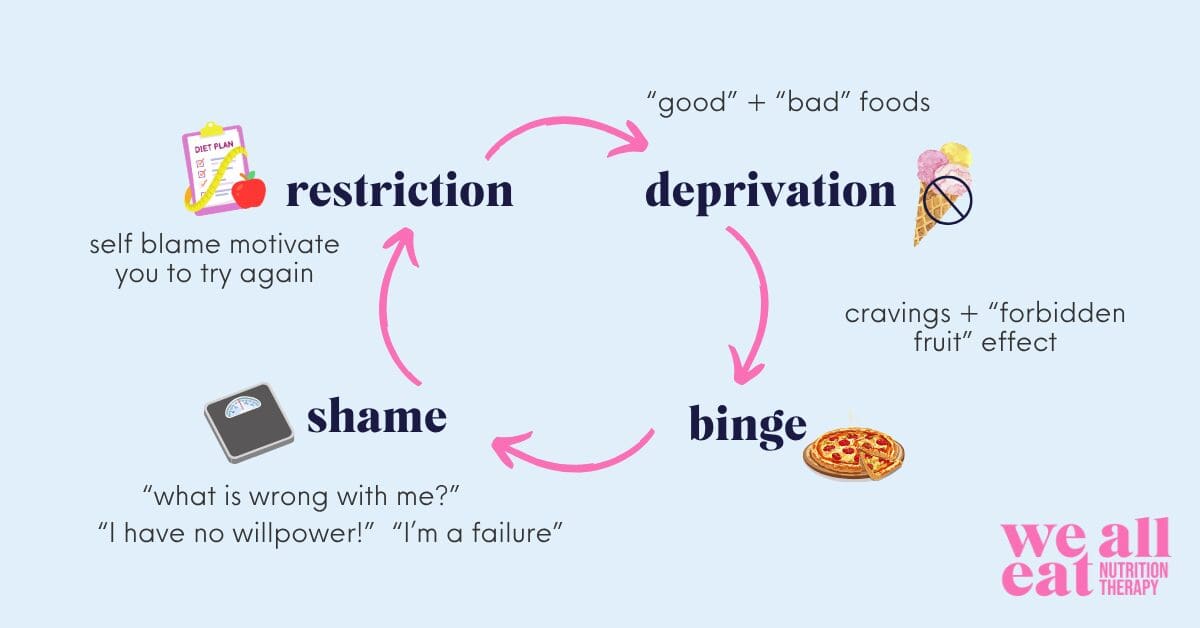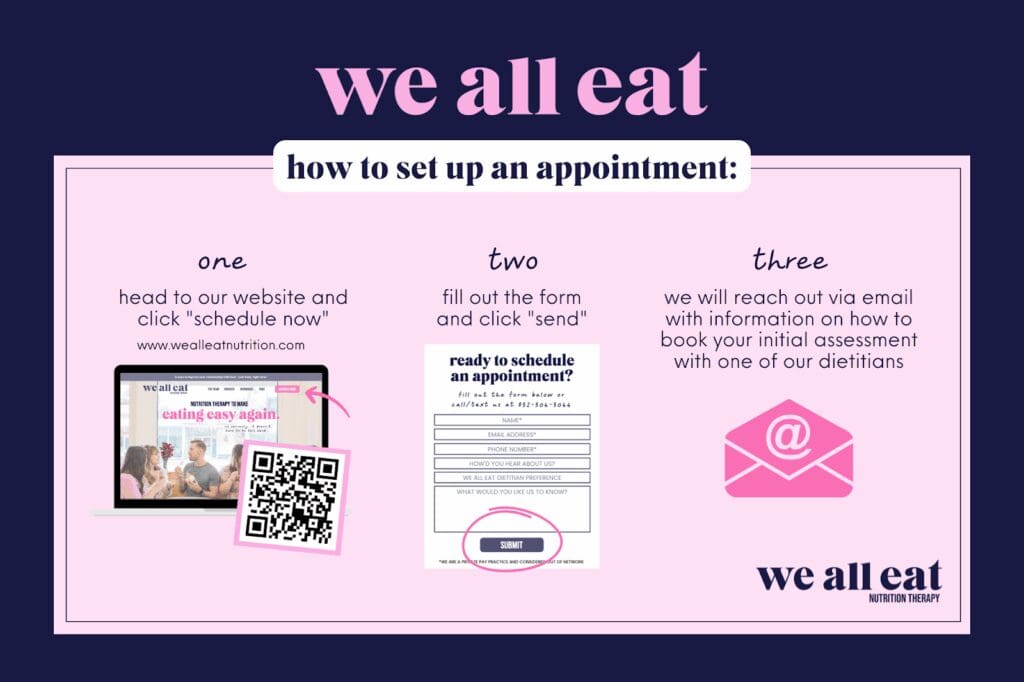June 12, 2025
If you have ever felt out of control around food, you’re not alone. Many people find themselves caught in a frustrating restrict-binge cycle, where they cycle between restricting what they eat, only to later binge eat or eat in a way that feels out of control.
This experience is commonly known as the restrict-binge cycle, and it has nothing to do with willpower or discipline.
In fact, the restrict-binge cycle is a completely natural response to food deprivation, both physically and mentally. At We All Eat Nutrition Therapy, we see this cycle play out in clients of all backgrounds, and we’re here to help break the shame and misinformation surrounding it.

What Is the Restrict-Binge Cycle?
The restrict-binge cycle refers to a pattern of eating where a person restricts or limits their food intake, followed by a period of overeating or binging. This can lead to feelings of guilt, shame, and a renewed commitment to restrict again, perpetuating the cycle.
It often looks like this:
- Restriction: Skipping meals, counting calories, avoiding certain foods, or trying to eat “perfectly.”
- Deprivation: Feeling extreme physical hunger, emotionally deprived, or both.
- Binge Eating: Eating in a way that feels out of control, often triggered by intense hunger or emotional overwhelm, typically after long periods of deprivation or avoidance of a food.
- Guilt and Shame: Feeling bad about eating “too much,” leading to restarting the cycle!

Why Does It Happen?
It’s easy to assume that binge eating is about a lack of willpower, but this couldn’t be further from the truth.
The human body is wired to protect you from starvation. When you restrict your food—especially carbohydrates or calories—your body responds by increasing hunger hormones and decreasing fullness signals.
This isn’t sabotage. It’s survival.
Psychological restriction plays a role, too. Even if someone is eating enough food, but they feel like they shouldn’t be eating certain foods (like candy, bread, or desserts), that mental restriction can still lead to a binge.
The brain perceives scarcity, and eating becomes more urgent, more frantic, and less satisfying.

Common Ways to Spot Food Restriction
Many people don’t realize they’re restricting because diet culture has normalized these behaviors.
Here are some subtle (and not-so-subtle) ways to spot food restriction:
- Skipping meals or snacks to “save up” for later
- Avoiding entire food groups (like carbs or fats)
- Replacing or delaying meals with coffee, gum, or diet drinks
- Only allowing sweets or comfort foods on certain days
- Using exercise to “earn or burn” food
If these behaviors sound familiar, it’s likely that you’re stuck in the restrict-binge cycle.
The Role of Diet Culture on the Restrict-Binge Cycle
Diet culture tells us that thinner is better, that eating less is virtuous, and that certain foods are “bad” or “off-limits.” It moralizes food choices and and links our physical appearance to our worth.
Unfortunately, this messaging contributes heavily to the restrict-binge cycle. When someone constantly hears that they need to be thinner, or that carbs are the enemy, it becomes very difficult to eat in a peaceful, nourishing way.
How to Break the Restrict-Binge Cycle
The good news? The restrict-binge cycle can be broken. Healing takes time, but it is absolutely possible.
Here are a few foundational steps:
1. Stop Restricting
Start by identifying and addressing any physical or mental restrictions. Are there certain foods you won’t allow yourself to have? Are you skipping meals or eating less than you need?
Give yourself unconditional permission to eat all foods. This doesn’t mean you’ll eat donuts all day forever, but allowing yourself to have them, takes away the urgency and novelty. Over time, your body learns to trust that food is always available.
2. Eat Regularly
Eat consistent meals and snacks throughout the day to meet your body’s energy needs. When you go too long without eating, your body panics and ramps up cravings and hunger.
Aim for 3 meals and 2–3 snacks a day, and include a mix of carbs, fats, and proteins to keep you satisfied.
3. Challenge Food Rules
Notice the rules you’ve absorbed from diet culture. Do you feel guilty for eating after 8 p.m.? Are you convinced carbs make you gain weight?
Write down those rules and challenge them. Ask: Where did I learn this? Is it actually true?
4. Work on Body Respect
You don’t have to love your body to treat it with respect. When you believe your body is worth nourishing, it becomes easier to eat in ways that feel supportive and sustainable.
Practice self-talk that affirms your body’s needs and values, even when it feels uncomfortable.
5. Seek Support
Breaking free from this cycle is hard to do alone. A non-diet dietitian, therapist, or support group can provide the validation, education, and accountability needed for real change.At We All Eat Nutrition Therapy, our team specializes in supporting clients through this exact process. We understand the nuances of eating disorders, disordered eating, and diet culture’s toxic grip. And we’re here to help you or your clients build a healthier, more trusting relationship with food and your body.

If you feel stuck in the restrict-binge cycle, know this: it’s not your fault. You are not broken. And you do not need more willpower. What you need is permission, consistency, and compassion.
The journey to food freedom doesn’t have to be walked alone. Reach out to a member of our team, or refer your clients to We All Eat for non-diet nutrition support. Together, we can help create a world where nourishment is intuitive, food is joyful, and bodies are respected at every size.
Ready to take the first step?📅 Book a session with one of our non-diet dietitians here or call/text 832-304-3044 and we’ll help you take the first step.
The restrict-binge cycle can feel overwhelming, frustrating, and never-ending—but it isn’t your fault.
In this blog, we explored how restriction (both physical and mental) leads to binge eating, why diet culture keeps clients stuck, and practical steps to interrupt the cycle.
From eating consistently to challenging food rules and practicing body respect, recovery is possible with support and compassion.
Whether you’re navigating this yourself or supporting clients through it, know that healing your relationship with food is not only possible—it’s absolutely worth it.